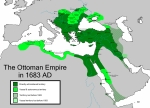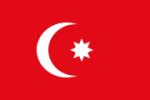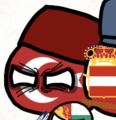Ottoman Empire
“
The ink of a scholar is worth more than the blood of a martyr.
— ![]() Mehmed II
Mehmed II
The Ottoman Empire was a giant empire based in modern-day ![]() Türkiye. Born in 1299. Before 1918, he had clay in the Arabian Peninsula, North Africa, the Balkans, Anatolia, and around the
Türkiye. Born in 1299. Before 1918, he had clay in the Arabian Peninsula, North Africa, the Balkans, Anatolia, and around the ![]() Black Sea. He died in 1923 and was replaced by his less competent successor,
Black Sea. He died in 1923 and was replaced by his less competent successor, ![]() Türkiye.
Türkiye.
He was once the boogeyman of Europe, feared for good reasons. The Ottomans were also one of few empire to spread across three continents being ![]() Asia,
Asia, ![]() Europe, and
Europe, and ![]() Africa.
Africa.
Ottoman also claims to be the rebirth of ![]() Rome.
Rome.
History
Beginnings
Main article: Lesser Ottoman Empire
The ![]() Kayı Tribe served the
Kayı Tribe served the ![]() Sultanate of Rûm. The Ottoman Empire was established after
Sultanate of Rûm. The Ottoman Empire was established after ![]() Ertuğrul Bey, the leader of the
Ertuğrul Bey, the leader of the ![]() Kayı Tribe, died. His son,
Kayı Tribe, died. His son, ![]() Osman I, claimed leadership and formed the Ottoman Empire. Ottoman successfully annexed several Beyliks.
Osman I, claimed leadership and formed the Ottoman Empire. Ottoman successfully annexed several Beyliks.
The Ottomans began expanding westward, conquering the ![]() Karasids and capturing their navy. They took advantage of
Karasids and capturing their navy. They took advantage of ![]() Byzantine internal conflicts to control areas, which strained relations with the
Byzantine internal conflicts to control areas, which strained relations with the ![]() Byzantine Empire.
Byzantine Empire.
After securing their position in Anatolia, the Ottomans conquered other Beyliks. They expanded into the Balkans, fighting the ![]() Serbian and
Serbian and ![]() Byzantine Empires over territorial disputes. The
Byzantine Empires over territorial disputes. The ![]() Timurid Empire, feeling threatened, declared war on the Ottomans, leading to a significant defeat and the capture of the Ottoman sultan. This sparked a 12-year civil war known as the "Fetret Devri."
Timurid Empire, feeling threatened, declared war on the Ottomans, leading to a significant defeat and the capture of the Ottoman sultan. This sparked a 12-year civil war known as the "Fetret Devri."
After the civil war, the Ottomans slowly regained strength, re-conquering small independent Beyliks in Anatolia and focusing on internal consolidation.
A New Power
Main article: Greater Ottoman Empire
Ottoman Empire began preparing for conquest of ![]() Constantinople. It was the only place
Constantinople. It was the only place ![]() Byzantine Empire had left. Ottoman Empire besieged the city for nearly two months before breaching its formidable walls using advanced cannons and strategic tactics. The fall of
Byzantine Empire had left. Ottoman Empire besieged the city for nearly two months before breaching its formidable walls using advanced cannons and strategic tactics. The fall of ![]() Constantinople was a turning point in history, it marked the end of the
Constantinople was a turning point in history, it marked the end of the ![]() Byzantine Empire and the beginning of Ottoman dominance in the region, also symbolizing the transition from the medieval to the modern era. It also made Ottoman expansion into Europe easier. Ottoman Empire replaced the fallen city with
Byzantine Empire and the beginning of Ottoman dominance in the region, also symbolizing the transition from the medieval to the modern era. It also made Ottoman expansion into Europe easier. Ottoman Empire replaced the fallen city with ![]() Istanbul, which became his new capital, where it remained a global center of trade, culture, and power for centuries and is still here today.
Istanbul, which became his new capital, where it remained a global center of trade, culture, and power for centuries and is still here today.
Ottoman Empire continued his conquests and ansuchlussed ![]() Serbia and
Serbia and ![]() Bosnia. He also vassalized
Bosnia. He also vassalized ![]() Wallachia,
Wallachia, ![]() Moldavia and
Moldavia and ![]() Crimean Khanate. After Ottoman Empire conquered
Crimean Khanate. After Ottoman Empire conquered ![]() Mamluk Sultanate, his influence became unstoppable. He was also rapidly expanding towards Africa, and almost killed off
Mamluk Sultanate, his influence became unstoppable. He was also rapidly expanding towards Africa, and almost killed off ![]() Kingdom of Hungary.
Kingdom of Hungary.
Ottoman, however began stagnating after conquering ![]() Kingdom of Hungary, but it still kept shadowing the entire Europe through its sheer size, science, economy and feared military might. Until the Great Turkish War, in 1683, that is.
Kingdom of Hungary, but it still kept shadowing the entire Europe through its sheer size, science, economy and feared military might. Until the Great Turkish War, in 1683, that is.
The Beginning of the End
In 1683, the 2nd Siege of ![]() Vienna failed, it was a military disaster to the Ottoman Empire as his supply lines were stretched and in unfamiliar territory with several incompetent commanders in charge.
Vienna failed, it was a military disaster to the Ottoman Empire as his supply lines were stretched and in unfamiliar territory with several incompetent commanders in charge. ![]() John III Sobieski led an unlikely alliance against the Ottomans siegrs and made a great charge against the unprepared siegers, breaking their line and sending them into a disarray. European players realized that the Ottomans was not so invincible.
John III Sobieski led an unlikely alliance against the Ottomans siegrs and made a great charge against the unprepared siegers, breaking their line and sending them into a disarray. European players realized that the Ottomans was not so invincible.
After the disaster at the Battle of ![]() Vienna,
Vienna, ![]() Pope Benedetto Odescalchi of Vatican Church saw it as a perfect opportunity to remove the religious threat of Ottoman Empire from the Balkans and hopefully push through its territories to Anatolia. Perhaps even the Holy Lands in Levant. And to bring
Pope Benedetto Odescalchi of Vatican Church saw it as a perfect opportunity to remove the religious threat of Ottoman Empire from the Balkans and hopefully push through its territories to Anatolia. Perhaps even the Holy Lands in Levant. And to bring ![]() Christianity back to the Balkans, also to kill those who refused to convert, whether they be a
Christianity back to the Balkans, also to kill those who refused to convert, whether they be a ![]() Muslim or
Muslim or ![]() Jew.
Jew.
![]() Holy League consisting of all of
Holy League consisting of all of ![]() Europe (except
Europe (except ![]() Kingdom of Portugal and
Kingdom of Portugal and ![]() Old Swiss Confederacy) was formed. They fought until in 1699, Ottoman Empire was pushed back and lost
Old Swiss Confederacy) was formed. They fought until in 1699, Ottoman Empire was pushed back and lost ![]() Hungary's former land to
Hungary's former land to ![]() Austria. That is when the
Austria. That is when the ![]() Europe started realizing that the Ottoman Empire had been stagnating for some time while they themselves grew stronger thanks to the colonization and exploitation of the
Europe started realizing that the Ottoman Empire had been stagnating for some time while they themselves grew stronger thanks to the colonization and exploitation of the ![]() New World, including the perks of
New World, including the perks of ![]() Industrial Revolution. And so started the long decline of Ottoman Empire.
Industrial Revolution. And so started the long decline of Ottoman Empire.
Ottoman Empire began losing every single region of theirs one by one. As the Europe was locked in an endless theatre of wars, some had the natural desire to expand and saw the weak, stagnating Ottoman Empire as the perfect target. It started with propaganda leading to the Ottomans being known as "the sick man of Europe" and supported the rebels inside, sowing ideas of independence and unjust treatment from Ottoman government. This led to many armed riots and insurrections, weakening the Ottoman Empire further.
Oppression
In 1830, ![]() Greece got their independence. In 1876, there was a famine in
Greece got their independence. In 1876, there was a famine in ![]() Bosnia which worsened the situation there. As a result and sign of defiance, they stopped paying their taxes and he grew more broke. Because of this and seeing the others successfully defy the Ottoman Empire, the Balkan regions started to break away from its control with the support of other European players.
Bosnia which worsened the situation there. As a result and sign of defiance, they stopped paying their taxes and he grew more broke. Because of this and seeing the others successfully defy the Ottoman Empire, the Balkan regions started to break away from its control with the support of other European players.
The Balkans held a strong grudge against the Ottoman Empire because it started imposing discriminatory laws and abandoned its original values of diversity. European powers took advantage of this multiculturalism to create divisions within Ottoman society, leading to its decline. The government became increasingly oppressive, favoring ![]() Muslims over minorities, which led to the suppression of minority beliefs and cultural practices. This oppression also hindered scientific progress, contributing to the Ottoman Empire falling behind
Muslims over minorities, which led to the suppression of minority beliefs and cultural practices. This oppression also hindered scientific progress, contributing to the Ottoman Empire falling behind ![]() Europe in the
Europe in the ![]() Industrial Revolution. The unfair treatment of minorities by the elite
Industrial Revolution. The unfair treatment of minorities by the elite ![]() Muslim Turks would have deeply saddened the past sultans if they could see what the empire had become.
Muslim Turks would have deeply saddened the past sultans if they could see what the empire had become.
These dark times when the ![]() Muslim Turks started oppressing the others: it is something many modern
Muslim Turks started oppressing the others: it is something many modern ![]() Turks do not know much about due to their purposeful ignorance or lack of awareness. Some prefer to see themselves as the victims. And some are even in denial. After long times of oppression and some nudges from European players, these regions continued to break away.
Turks do not know much about due to their purposeful ignorance or lack of awareness. Some prefer to see themselves as the victims. And some are even in denial. After long times of oppression and some nudges from European players, these regions continued to break away.
Balkan Wars
The year was 1912 when the First Balkan War broke out, with the support of Great Powers in supplies, intel and weapons. It ended with Ottoman Empire losing almost all lands in the Balkans. A huge amount of ![]() Turks numbering in millions was deported by force from the Balkans to Anatolia. Many people died in this forced displacement. To this day, many descendants of modern
Turks numbering in millions was deported by force from the Balkans to Anatolia. Many people died in this forced displacement. To this day, many descendants of modern ![]() Turks could do a DNA research and see that their direct ancestors were not only from the Anatolia, but also the Asia and Europe, particularly Balkans.
Turks could do a DNA research and see that their direct ancestors were not only from the Anatolia, but also the Asia and Europe, particularly Balkans.
In 1913, ![]() Bulgaria wasn't happy with the land he gained in the First Balkan War. So, when the Great Powers drew new borders in the Balkans that Bulgaria didn't like, he started a new fight called the Second Balkan War against
Bulgaria wasn't happy with the land he gained in the First Balkan War. So, when the Great Powers drew new borders in the Balkans that Bulgaria didn't like, he started a new fight called the Second Balkan War against ![]() Serbia and
Serbia and ![]() Greece. The Ottoman Empire used this opportunity to regain some territory and improve his reputation.
Greece. The Ottoman Empire used this opportunity to regain some territory and improve his reputation.
Young Turks
After years of decline, in 1915, Ottoman Empire was exhausted by their recent wars in the Balkans and a revolution where the ![]() Young Turks took over.
Young Turks took over.
The ![]() Young Turks, despite being seen as forward-thinking, were guilty of terrible acts. They secretly ordered the deportation of
Young Turks, despite being seen as forward-thinking, were guilty of terrible acts. They secretly ordered the deportation of ![]() Armenians, leading to a tragic and bloody event. Hundreds of thousands were forced from their homes and sent on a harrowing journey to modern-day
Armenians, leading to a tragic and bloody event. Hundreds of thousands were forced from their homes and sent on a harrowing journey to modern-day ![]() Syria. Many died from abuse, harsh weather, and starvation along the way, making it a journey of certain death for countless
Syria. Many died from abuse, harsh weather, and starvation along the way, making it a journey of certain death for countless ![]() Armenians. This is known as the Armenian Genocide.
Armenians. This is known as the Armenian Genocide.
The Great Powers used the tragic events, like the ![]() Armenian deportation, as powerful propaganda against the Ottoman Empire. Over time, the Ottoman Empire had declined culturally, socially, and technologically. He had once been a beacon of
Armenian deportation, as powerful propaganda against the Ottoman Empire. Over time, the Ottoman Empire had declined culturally, socially, and technologically. He had once been a beacon of ![]() progressiveness, where people of various ethnicities, colors, beliefs, and
progressiveness, where people of various ethnicities, colors, beliefs, and ![]() religions coexisted peacefully. However, by the early 20th century, he had become the opposite. Minorities like
religions coexisted peacefully. However, by the early 20th century, he had become the opposite. Minorities like ![]() Kurds,
Kurds, ![]() Armenians,
Armenians, ![]() Arabs,
Arabs, ![]() Greeks,
Greeks, ![]() Serbians,
Serbians, ![]() Jews, and
Jews, and ![]() Christians were treated as second-class citizens, or even worse, compared to Turkish
Christians were treated as second-class citizens, or even worse, compared to Turkish ![]() Muslim citizens. This social situation had deteriorated over the past 150 years due to an increasingly
Muslim citizens. This social situation had deteriorated over the past 150 years due to an increasingly ![]() authoritarian government favoring
authoritarian government favoring ![]() Islam and oppressing minorities.
Islam and oppressing minorities.
The Great War & The End
Ottoman Empire was forced into the Great War after a part of their navy attacked the ![]() Russian harbors under the command of a
Russian harbors under the command of a ![]() German officer thus leading to
German officer thus leading to ![]() Russian Empire declaring a war and thereby their
Russian Empire declaring a war and thereby their ![]() allies as well. It did not help that the
allies as well. It did not help that the ![]() British Empire had kept the caught battleships to himself, angering the Ottomans greatly.
British Empire had kept the caught battleships to himself, angering the Ottomans greatly.
Eventually, the ![]() Entente Powers won. Ottoman Empire was now up for partition, leading to a new
Entente Powers won. Ottoman Empire was now up for partition, leading to a new ![]() Turkish government to be formed to defend himself the partition, ending the Ottoman Empire. It was about time, too, the Ottomans had already ruled for over 600 years.
Turkish government to be formed to defend himself the partition, ending the Ottoman Empire. It was about time, too, the Ottomans had already ruled for over 600 years.
Relations
Friends
 Swedish Empire - Another ally that helped me in the Great Northern War.
Swedish Empire - Another ally that helped me in the Great Northern War.
Enemies
 Byzantine Empire - I'm in your walls...1453 was the best year of my life, roasted you on a stick like a kebab! But since I have obtained your clay, why not... take revenge on the
Byzantine Empire - I'm in your walls...1453 was the best year of my life, roasted you on a stick like a kebab! But since I have obtained your clay, why not... take revenge on the  Crusaders together!
Crusaders together! Timurid Empire - The worst Turks, they defeated me in Anatolia and kidnapped my sultan. But, this won't be the case for long.
Timurid Empire - The worst Turks, they defeated me in Anatolia and kidnapped my sultan. But, this won't be the case for long. Holy League - These losers thought they could push me out of
Holy League - These losers thought they could push me out of  Europe, 1444 and 1453 worst year of your life, ALSO YOU CANNOT INTO
Europe, 1444 and 1453 worst year of your life, ALSO YOU CANNOT INTO  CONSTANTINOPLE ALHAMDULILAH!!!!
CONSTANTINOPLE ALHAMDULILAH!!!!
Informational Gallery
-
Ottoman Empire's Greatest Extent
-
Flag-Map of Ottoman Empire with all Tributary States (1668)
-
Flag of Ottoman Empire (after 1844)
Gallery
-
Ottoman is strongest!
-
tired





